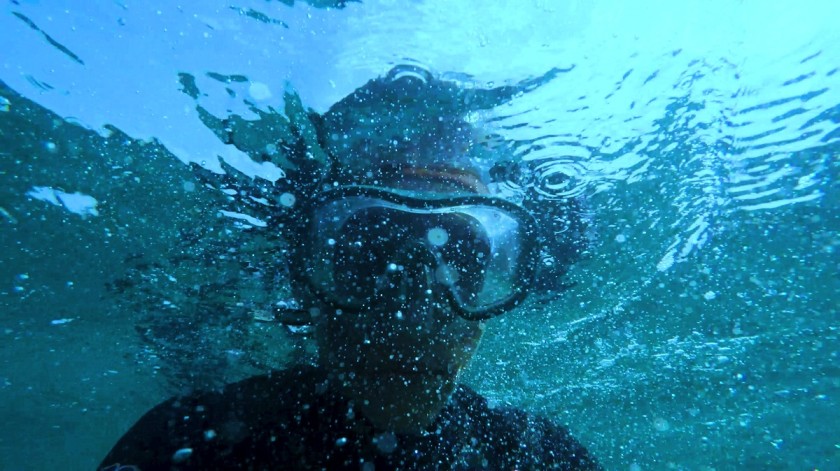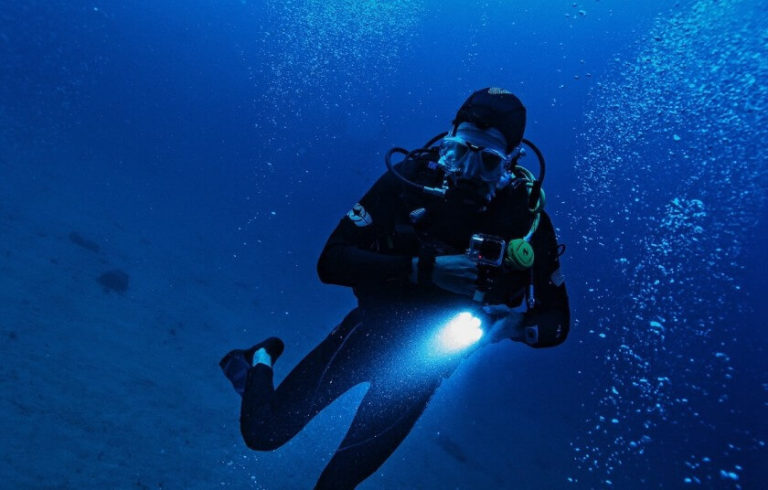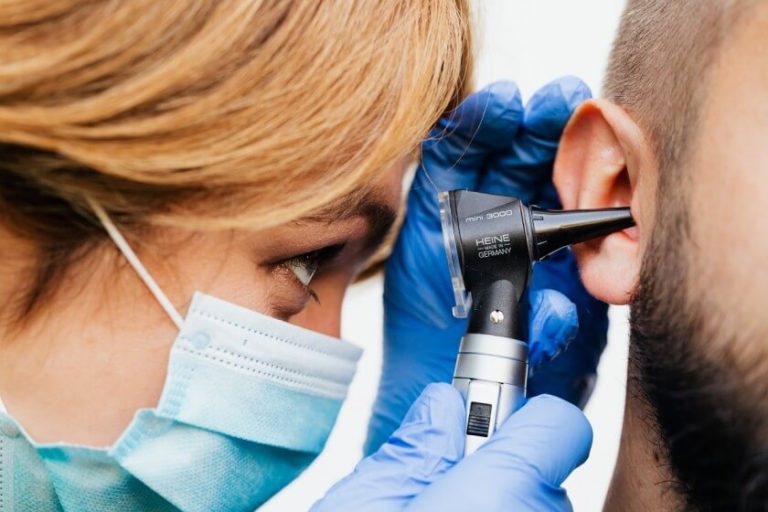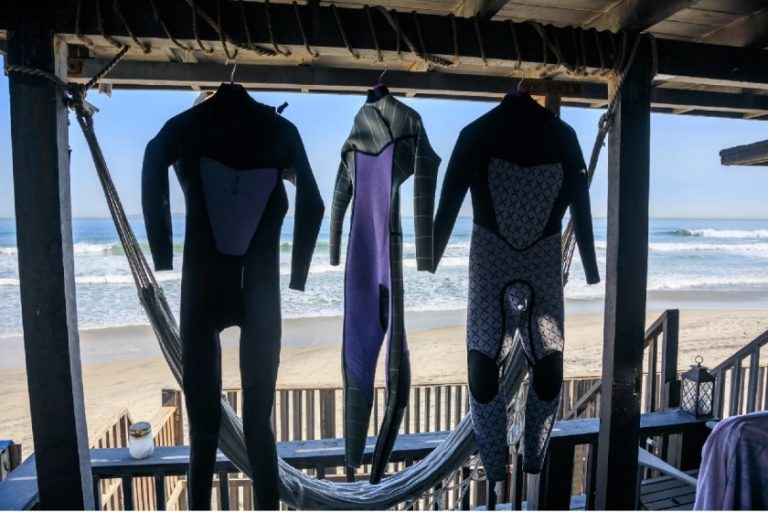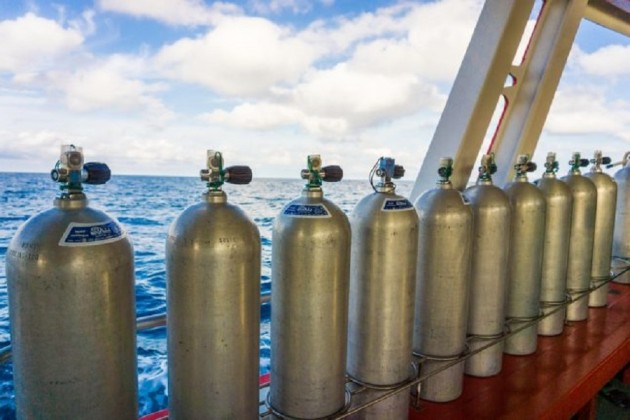Why Do Divers Spit In Their Masks?
Saliva outside of the mouth is displeasing to many people. Spitting in public is frowned upon and disgusting. But that’s not why you are here, the main purpose of this article is to understand why do divers spit in their masks?
Divers spit in their masks to prevent mask fogging during the dive. Spit acts as an anti-fog by reducing the surface tension of water. With lower surface tension, tiny strings of water droplets can’t form on the lenses causing fogging.
A fogged mask affects visibility and can cause panic among some divers, especially beginners.
A common example of how fogging occurs in a diving mask is when driving on a very cold day. After a few minutes inside the car, you’ll notice fogging on the windows.
This happens because as you breathe the warm air from your breath fills in the car. Cold air on the outside meets the warm air on the windows causing condensation. Moisture in warm breath forms very tiny strings of water droplets on the windows causing fogging.
You can’t use spit on your car windows to prevent fogging but this natural anti-fog works well for diving masks.
In the next few minutes, we’ll look into what makes spit a good anti-fog, should you spit into your mask, other defogging alternatives and so much more.
Let’s get right into it!
💡FACT: Scuba diving is a great way to work out. You can burn up to 600 kcal per hour underwater! 🥽
Don’t use defogging agents that harm wildlife. Check out our reef-friendly mask defog! Tested and proven safe for you and our environment.
.#Stream2Sea #ProtectWhatYouLove pic.twitter.com/8y5P9rF8d8— Stream2Sea 🦈 (@Stream2Sea) April 24, 2022
Why Do Diving Masks Fog Up?
Diving masks fog up due to high surface tension and the difference in temperature inside the mask lenses and that on the outside.
When diving, the surrounding temperatures are cool or cold from the water around you. Inside the mask, the temperature can increase as the diver breaths.
The warm air contains water vapor that condenses forming tiny strings of water droplets on the inner side of the lens.
Warm air from the divers’ breath is immediately condensed once it reaches the mask lens as the outside temperatures are cold.
Most importantly fogging on masks happens due to high surface tension between the lenses and water. If the mask isn’t pretreated to prevent fogging, then the tiny strings of water will easily attach to them.
Pretreating your dive mask lowers this surface tension making it difficult for the water droplets to attach and stick onto the lenses. The water droplets can only form large water bubbles that flow down like water in your mask.
Other factors that contribute to mask fogging include putting the mask on a wet face. This increases the amount of moisture available in the mask increasing fogging.
Talk about a “spitting image.” Prior to a dive, SCUBA divers often spit in their masks to prevent the mask from fogging. The spit coats the lens + the layer becomes too smooth for the condensed vapor to cling. #scubadiving #cleaquarium pic.twitter.com/Dasz3grlrE
— Greater Cleveland Aquarium (@cleaquarium) July 14, 2018
Why Does Spit Stop Fog?
Spit stops fog since it’s a great surfactant.
Surfactants prevent fogging by lowering surface tension in the water. In presence of a surfactant, water molecules cant stick closely together. Water spread out forming large droplets instead of tiny strings of many closely packed droplets.
Once the water vapor is condensed on the lenses pretreated with saliva, the water forms large droplets that easily flow down the lenses.
Large water droplets formed are loosely holding onto the mask lenses and can easily flow down the mask. As one water droplet flows down the lens, it joins other drops of water and flows as one stream.
Since fogging happens when tinny water droplets remain intact on the lens, as the water flows down fogging is prevented.
Spit acts as any other commercial anti-fog or any homemade anti-fog spray. All these have surfactants that will stop fogging in the mask.
Should You Spit In Your Diving Mask?
If you don’t have an anti-fog treatment for your mask, then you can spit into it since they all perform the same function.
If you have an anti-fog with you then there is no point in spitting in your mask, simply use the anti-fog treatment.
Spitting in a diving mask is common among divers as spit is readily available and all-natural making it good for the environment.
Carrying an anti-fog can be hectic especially if you don’t have any space to store it. In addition, you won’t always remember to carry the anti-fog each time you go diving. In such a scenario, spit is the only option available for use.
However, if you find spitting totally disgusting and would never in a million years do it, then there is no pressure at all to spit into your mask. There are many other ways to prevent fogging in your mask.
Defogging your scuba mask or swim goggles pic.twitter.com/RwMgvHIn80
— Milhan (@mmilhanm) August 17, 2016
How to Use Spit To Prevent Mask Fogging
Now that you have an idea of what makes spit a good anti-fog, you may be wondering how you should use it.
This should only be done when you are about to jump into the water. Spitting into your mask before the dive won’t be effective as the spit will dry up quickly.
When you are ready to jump into the water, you want to spit into the lenses and spread the spit all over the lens using your fingers.
Once you’ve coated the lenses in spit, dip the mask into the water and quickly remove it. Drain all water from the mask and put it on.
You are now ready to enjoy your dive.
Remember as you dive you may need to clear the mask. It’s important to have mask clearing skills at the tip of your fingers.
While you may have stopped mask fogging, you need to clear water formed within the mask as this can be annoying. No one wants water filling in their mask or getting into their eyes.
READ MORE: Best Scuba Diving Masks for Small Faces
How Do I Stop My Mask From Fogging Up?
Spitting into your mask is only one of the many ways available to prevent mask fogging.
Other ways to prevent fogging include;
- Pretreating your mask
- Use a defogging solution
- Antifogging sprays
- Baby shampoo
- Drying your face
- Use a gentle toothpaste
Thanks to my scuba daddies for the newest addition to my scuba gear❤️
The white substance on the mask is toothpaste- really good at defogging new masks. We could also pretend it’s cu- pic.twitter.com/jHtRKOzO8V
— Erin Estrella ⭐ Manila (@MsErinEstrella) July 30, 2021
Pretreating Your Mask
Brand new diving or snorkeling masks will fog up more compared to old masks. This is because a new mask still has a lot of residue from the manufacturing industry that increases surface tension.
Even if you can’t see it, there is something on the mask that will increase fogging. Recent diving masks have a thin film of silicon that can result in rapid fogging since the water droplets attach easily to the mask lens.
Once you buy a new diving mask, it’s important to pretreat it. Ways to pretreat your mask include;
- Passing a flame over the lenses
- Use toothpaste
Pass a flame over the lenses to remove the thin layer of silicon. Be careful not to burn your mask. You can use a candle flame or simply use a lighter.
After the flaming, apply a gentle toothpaste all over the lenses and leave it overnight. In the morning use a soft piece of cloth or toothbrush to lightly wash off the toothpaste. Rinse the toothpaste off using cold clean water.
Avoid using whitening toothpaste as this can be too harsh on the mask. Avoid mint toothpaste as it will leave a minty smell in the mask which can be irritating to the eyes.
Once you have pretreated your new mask, you are all set for diving. You can simply wear the mask without applying a defogging solution. If you wish to go the extra mile, then no problem using an anti-fog solution.
Defogging Solutions & Antifogging Sprays
Available as sprays or drops, these are simple ways to prevent fogging in your mask. You can find a good solution or spray starting as low as $6.
My two all-time favorites are Cressi Anti-Fog Solutions for Snorkeling and Diving Masks and Just Add Water Jaws Solutions Quick Spit Antifog.
Many of the defogging solutions come in a variety of options. you will find a spray, gel solution, or a sponge antifog option. Pick any that appeals to you.
The anti-fog sprays come in a compact size easy to carry around and can fit in a BCD pocket. You get great value for less than 10 dollars.
If you dive quite often this will be a great add-on to your mask care essentials and will last you sometime before replacing.
Simply apply the solution onto your mask, then rinse in clean water before diving. These products act by lowering water surface tension and preventing or stopping fogging.
After using these solutions, it’s important to take care of your mask post-diving. Rinse off the mask, avoid touching inside the lenses and store them properly.
Baby Shampoo
Another common anti-fog treatment for diving masks. Baby shampoo is preferred over regular shampoo since it’s mild and gentle.
These shampoos have the right amount of surfactants needed to stop fogging in the mask. Regular shampoos tend to be harsher and also have other ingredients that can be too harsh on the lenses.
Use a few drops of the shampoo diluted in water, then apply it to your mask and rinse.
Remember to rinse your mask after diving.
Dry Your Face
Wearing your mask on a wet face increases the moisture available increasing fogging.
To reduce this, pat your face with a towel or dry cloth before putting the mask on. On very humid days, divers will notice more fogging in their masks.
If diving in a humid place or weather, always carry a towel to pat your face dry.
READ MORE: Are Scuba And Snorkel Masks The Same?
Behaviors to Prevent Mask Fogging
Preventing mask fogging goes beyond pretreating or treating your mask with an anti-fog solution. How you handle your mask before and after diving can also impact fogging in your next dives.
- Avoid touching the lenses and inside your mask. This will introduce oils and other products used on your skin that increase surface tension within the mask increasing fogging. Avoid touching the lenses, especially when applying the solution. A good practice is applying the defog solution to your fingers before applying it to your mask.
- Don’t over-rinse the defogging solution. you don’t want to remove the applied solution before diving.
- Avoid breathing through your nose. This is a common reason why masks fog up quickly. As a beginner, it will take time to learn how to breathe in and out using only your mouth. Breathing out from the nose introduces warm air within the mask. As mentioned above, this warm air has a lot of water vapor which will cause fogging.
- Pick a well-fitting mask. A fitting mask prevents moisture from getting in increasing the water available for condensation and fogging. A mask bigger than your fit will result in breathing out of your nose introducing warm air. As more water flows into the mask you’ll need to breathe through the nose to clear it. When buying a mask, pick one that sits perfectly near the nose and seals perfectly onto your face.
- After diving, always rinse your mask with some lukewarm water to remove any dirt and leftover solution. Pat the entire mask dry and store it in a safe place.

Parting Words
We’ve seen that divers spit in their masks to prevent or stop mask fogging. Saliva acts as a surfactant lowering the surface tension of water droplets. With low surface tension, fogging is prevented.
We’ve also looked into some other options available to prevent fogging if you are turned off by the idea of spitting into your mask.
I’ve mentioned my top 2 antifogging sprays, there are many more varieties available online at a very affordable price.
Should you spit in your mask? Yes if you don’t have a defogging solution but it’s not mandatory if you don’t want to.
After buying your first pair of diving masks remember to pretreat them before using the mask. Applying a defogging solution only will not work effectively on your brand new mask, you need to pretreat it first.
I hope this article answered all the questions you had on why do divers spit in their masks.

